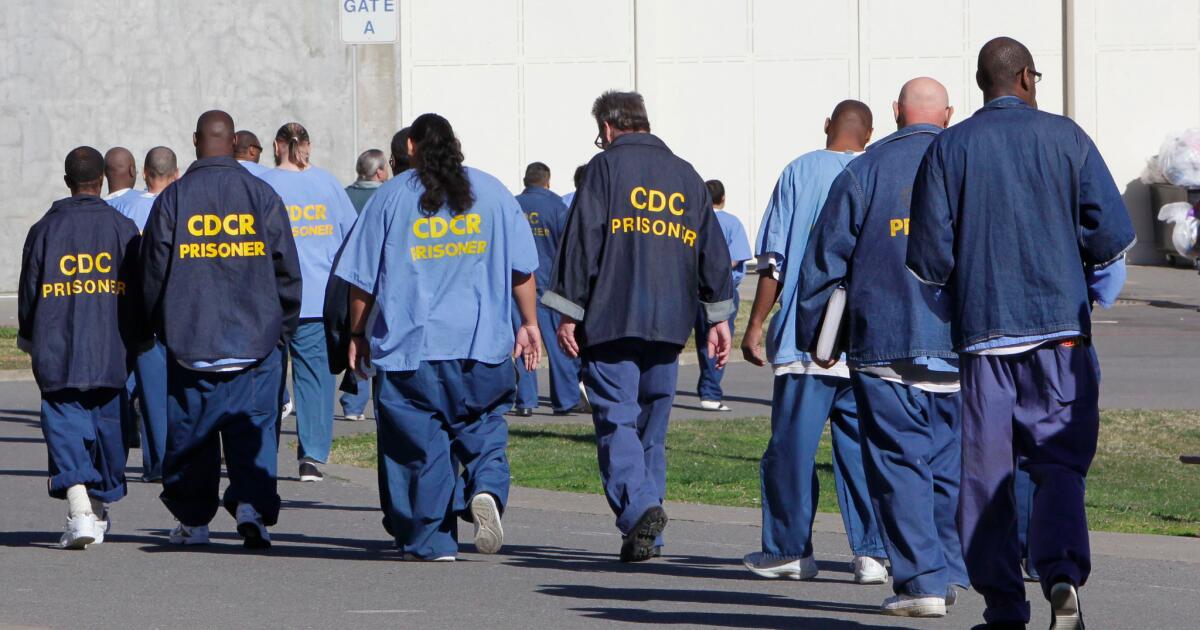Motivating bad guys to become good guys? That’s worth a ‘yes’ vote
Reporting from Sacramento — Gov. Jerry Brown is still haunted by one thing he did as a young governor 40 years ago. And he hopes to finally undo it on election day.
In 1976, pressured from the left, he signed a bill that made California prison time more fixed and less dependent on the discretion of parole boards.
Flexible sentencing, based on a board’s assessment of a felon’s likelihood of going straight once released, “was criticized because it treated people differently,” Brown told me last week.
“Nobody thought, ‘Well, wait a minute! People are different.’”
The rap by liberals on parole boards was that black and Latino prisoners were being kept behind bars longer than white people who had committed the same crimes.
So the boards lost much of their power to release prisoners based on good behavior or to keep them locked up if they still seemed dangerous. Release times were pretty much set in stone by sentencing judges.
“What I didn’t think of,” Brown says, is that with fixed sentences “there would be no incentive. You’d be released no matter what you did. Some people need a powerful incentive.”
Incentives, he says, “to buck gangs — they can slit your throat — to avoid narcotics, to not break the rules and take programs that will help you turn your dysfunctional life around.
“The idea of just putting someone in a box and waiting for time to elapse is not smart.”
Brown has been talking this way for years. He finally got around to doing something last winter. He latched onto someone else’s juvenile justice ballot initiative and inserted his criminal sentencing overhaul. The state Supreme Court ruled that was OK.
Brown’s idea became Proposition 57.
The proposal is laden with the wonky words such as “determinate” and “indeterminate.” In everyday language, they mean fixed and flexible.
Proposition 57 would return sentencing part-way back to the old days.
“It worked a hell of a lot better then,” the governor says. “Better than what the Legislature created. It’s not a place of deep reflection.”
His proposal would affect only prisoners convicted of “nonviolent” crimes, Brown says.
Nonsense, say opponents, largely prosecutors. They argue that many felons who would be eligible for early release actually committed violent offenses.
Under the measure, a prisoner could apply for parole after he had served the full sentence for his nonviolent primary offense. But he wouldn’t need to have served time for any add-on sentencing “enhancements,” such as for using a gun or being a “three-strikes” repeater.
Opponents argue that prisoners would be eligible for early parole even if they had been convicted, for example, of raping an unconscious woman, participating in a drive-by shooting or taking a hostage.
“It literally unwinds three strikes,” says San Luis Obispo County Dist. Atty. Dan Dow, Central Coast chairman of the opposition campaign.
“It’s the worst thing to happen to public safety in California in 40 years.”
The prosecutor adds: “There aren’t any nonviolent inmates in prison today. You can only go to prison if you’ve committed a very serious crime.”
Brown’s earlier “realignment” program required counties to jail lower-level felons rather than send them to state prison.
Because of a federal court order to reduce overcrowding in lockups, there are roughly 50,000 fewer inmates in state institutions today than when Brown returned as governor in 2011. Prosecutors say prisons are holding only the worst of the worst.
“This is the governor at his worst,” says Merced County Dist. Atty. Larry Morse, state co-chairman of the opposition campaign. “I’m a Democrat. I’ve supported him more than I’ve disagreed. But this is the hubris of being a second-term governor.”
Actually, it’s Brown’s fourth term.
Morse says he and other prosecutors are particularly incensed that the governor didn’t invite them into the planning for Proposition 57.
“He conceived this in the governor’s office without any collaboration with district attorneys, sheriffs or police chiefs,” Morse says. “It’s a seriously flawed product.”
Brown counters that the measure “allows flexibility. The case for it is irrefutable to anyone with an open mind.”
Under Proposition 57, prisoners would get credit for good behavior, rehabilitation and education achievements.
Much less controversial is a provision that would require judges, rather than prosecutors, to decide whether a juvenile should be tried as a minor or an adult.
Practically all the campaign money is on Brown’s side. He has a political kitty stashed with millions. The opposition has practically zilch.
This is not the kind of ballot measure that excites moneyed interests. It doesn’t affect the bottom lines of corporations or labor, so there’s no motivation to bankroll the opposition campaign. In fact, the opposite is true. No outfit involved politically in Sacramento wants to cross the governor.
Polls show Proposition 57 heavily favored by voters. And Brown retains a high job approval rating.
The proposition’s central question is: Should a felon’s sentence only reflect the evil he committed on a particular day? Or should he be given an opportunity for partial redemption by trying to turn his life around over several years of incarceration?
People usually act better when there are rewards for being good and punishment for misbehaving — that’s the concept of heaven and hell.
Opponents have good points. Brown should have conferred with more experts in planning. And he should have better defined “nonviolent.”
But the broad goal of motivating bad guys to become good guys is worth a “yes” vote.
Follow @LATimesSkelton on Twitter
ALSO
Why Gov. Jerry Brown is staking so much on overhauling prison parole
Sanchez redoubles her critique of Gov. Brown’s Proposition 57 — and Harris
Two-thirds of Californians favor Gov. Jerry Brown’s plan to revamp prison parole rules
